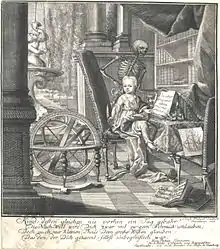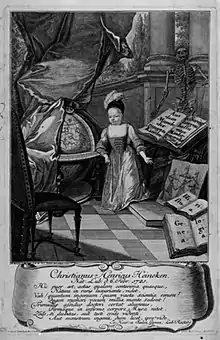Christian Heinrich Heineken
Christian Heinrich Heineken or Heinecken (February 6, 1721 – June 27, 1725), also known as "the infant scholar of Lübeck", was a German child prodigy who lived only to the age of four.


Life
He was born in Lübeck, Germany, the son of Paul Heinecken, a painter and architect, and Catharina Elisabeth Heinecken, an artist and alchemist.[1][2] His brother, Carl Heinrich von Heineken, became an art historian and collector and was later knighted.[2]
It is said that when he was ten months old, he could speak German. He read the Pentateuch at age one,[1] and between the ages of two and three, he read the Old and New Testament in Latin.[1] When he was three years old, he was said to have recited his own History of Denmark when visiting the King of Denmark.[1] Also at three he testified in court to the murder of his friend, another boy named Reid.[1] He died at age four of celiac disease.[3] He was breastfed until close to his death, which was very likely caused by the ingestion of grain products.[4]
While his exploits may seem hard to believe, they are relatively well documented. In 1726, his tutor (a man named Schöneich) published a study of Christian entitled The Life, Deeds, Travels and Death of the Child of Lübeck.[1][5] Immanuel Kant wrote an essay about the child calling him an "ingenium praecox" (someone "prematurely clever").
See also
| Wikimedia Commons has media related to Christian Heinrich Heineken. |
References
- Chisholm, Hugh, ed. Encyclopaedia Britannica, vols. 13-14, pp. 215-16.
- Vollmer, Hans (ed.), Allgemeines Lexikon der Bildenden Künstler von der Antike bis zur Gegenwart (General Dictionary of Visual Artists from Antiquity to the Present). Vol. 16, p. 292; vol 21, p. 530; vol. 25, p. 575. Leipzig: EA Seemann, 1923. (In German)
- "Unsterblichkeit der Frühe". Süddeutsche Zeitung. Feuilleton (in German). January 17, 2004. p. 15. Archived from the original on July 21, 2006.
- Kaus J. Hennig (22 December 1999). "Ein Kind zum Anbeten" (in German). Zeit Online GmbH, Hamburg, Germany.
- "The Child of Lubeck". Everything.com.
Other sources
- Barlow, F. Mental prodigies. New York: Philosophical Library, 1952.
- Long, G. (ed.). Penny Cyclopaedia. Society for the Diffusion of Useful Knowledge, 1838.